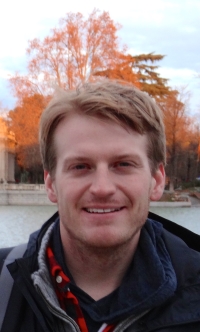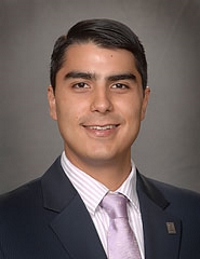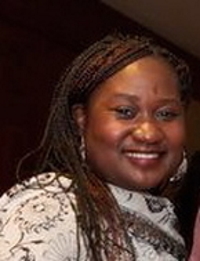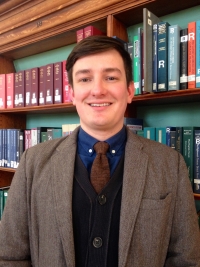The
graduate student fellows
for the 2015-16 Cultures of Law program are:
Ryan Bean (History)
Juan Bernal (Philosophy)
Thornton Miller (Musicology)
Brenda Sanya (Education)
Nathan Tye (History).

Ryan Bean, History
My research focuses on the legal and extralegal strategies of urban Indians and castas in colonial Lima and the ways in which these groups employed said tactics to alter Spanish spatial imaginaries in the viceregal capital from 1570 to 1700. In doing so, I show how their actions forged a culturally diverse milieu that profoundly transformed urban Spaniards' religious and cultural identities. Since colonial Lima is often thought of as a bastion of Spanish culture in the Andes, this research will allow us to rethink indigenous peoples’ roles in politically and culturally shaping one of the most important cities in the Spanish Empire.Juan Bernal, Philosophy

My research focuses on how the ongoing-armed-conflict in Colombia has induced a culture of violence that endorses retributivist ideals of justice, which generate an obstacle to the notion of transitional justice sought in the peace negotiations between the Fuerzas Armadas Revolucionarias de Colombia (Revolutionary Armed Forces of Colombia), commonly known as FARC, and the Colombian government. The project will answer three questions: (1) How the armed conflict has led to a culture of violence; (2) how political corruption has led to deep distrust of the political system and legal accountability; and (3) how this culture of violence and political distrust are affecting the notion of transitional justice sought in the peace negotiations. The research project will focus on this last question to understand what obstacles transitional societies face and what must give way in order for alternative forms of justice to succeed in achieving justice and sustaining peace.

Thornton Miller, Musicology
I am a PhD student in Musicology who is pursuing a doctoral minor in Russian, East European, and Eurasian Studies. My research interests include Anglo-Soviet personal and institutional cultural exchange and the effect of intellectual property rights on these exchanges from the mid-1950s to the mid-1970s. Cultural exchange between the Soviet Union and the United Kingdom served both to cultivate international understanding and to promote détente. Musically, these exchanges were manifested largely in the travel of musicians, ensembles, recordings, and sheet music between the two countries. But, this practice did not emerge easily: both states had very different political and economic systems, different policies towards intellectual property law and the exchange of information, and constantly changing political climates.Brenda Sanya, Education

My dissertation project examines the experiences of the rapidly growing population of Black Anglophone African students who come to the United States for higher education and remain as short and long-term workers. I draw upon theoretical perspectives from the fields of Black/African diaspora, postcolonial, and queer studies to explore racialized embodied experiences of these students. In developing my project, I make the case that these student-migrants’ experiences illustrate the myriad of interpretations of immigration law and the privileges these laws can provide. As such, while immigration laws and documentations provide authorization to cross borders, gain academic credentialing, and retain employment, Black Anglophone African students-migrants who come to the US for higher education are simultaneously included into and excluded from a full spectrum of rights given to other immigrants. Like all student-migrants, Black Anglophone Africans are tethered to their institutions and limited in their ‘flexibility’ because immigration documents are obtained by, and contingent upon their jobs. Furthermore, Black Anglophone African student-migrants are both subject to discriminatory practices based on US racial biases while at the same time transforming those very dynamics with their own insertions into US racial stratification.

